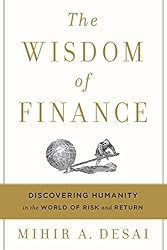Weekly Bookmarks –
128th Edition – July 18, 2021
Finance, ultimately, is a set of tools for understanding how to address a risky, uncertain world.
Mihir A. Desai, The Wisdom of Finance
1. The Fab Five
You might recall the University of Michigan basketball team named the Fab Five. I’m using that term to describe my five favorite books through the first half of 2021. Of the 60 books I’ve read or listened to, here’s my list in the order that I read or listened to them:
- Railroader by Howard Green (book)
- It’s How We Play the Game by Ed Stack (audio)
- Full Circle by Erin Callan Montella (book)
- Leadership in Turbulent Times (book)
- The Wisdom of Finance (book and audio)
2. Honorable Mentions
On this week’s podcast, our guest host asked if there were other books I liked that didn’t make the Fab Five. I mentioned six titles that stood out.
Switchpoints by Judy Johnson – Judy’s consulting team was instrumental in the cultural turnaround at CN under the leadership of Hunter Harrison. This book stands out for its simplicity and easy-to-implement tools, even for us financial types.
Profit Wise by Jeff Morrill is written by the co-founder of the largest Subaru dealership in America. He penned the words to his book as he was recuperating from a serious banking accident.
Many Unhappy Returns by Charles Rossotti is the story of a co-founder of a public company asked to run the IRS for five years. Through simplification, enhancing the leadership team, spending on the right technology, getting priorities right, and a strong focus on customer service resulted in major changes during those five years.
Heist! The Oddball Crew Behind the $17 Million Loomis Fargo theft was almost hilarious. I had to keep reminding myself this was a true story.
The Wizard of Lies has been turned into an HBO movie and was a painful book to read about a man who was seemingly not remorseful for his Ponzi scheme. Still, this account of Bernie Madoff was worthwhile reading.
Dead Companies Walking by Scott Fearon was the first book I have ever read on how an individual investor goes about shorting stocks.
3. Rereads
During the podcast episode, Shaefer Schuetz asked if I ever reread books. This football standout is quite perceptive. That’s because I do.
I was thrilled to interview David Farber a few weeks ago. He’s the author of a book that every CFO should read – Everybody Ought to Be Rich. The book is the lifelong story of John Jakob Raskob, one of the most brilliant financial minds in the modern business era. Reading it a second time was as illuminating as the first.
I’m not much of a self-help books reader. However, I listen to Dan Sullivan’s Pure Genius annually. Even my kids loved the audio series when they were teens. The material is available at NightingaleConant.
If you like Drucker, you might possibly like A Class With Drucker. Instead of reading it a second time, I listened to it a few weeks ago. What a perfect way to gain more insights from one of the most proactive management thinkers over the past 75 years.

4. Fiction
“No, I don’t read much fiction.” That’s what I told Shaefer when he asked me about the books I read beyond non-fiction.
When it comes to literature, I prefer the classics. Three of my favorites are Crime and Punishment, Uncle Tom’s Cabin, and Great Expectations. Novels by G.A. Henty and Mark Twain are also high on my list. During the winter holidays, I hope to finally read The Count of Monte Cristo.
I did get two works of fiction completed in the first half: The Story Keeper by Lisa Wingate and O Pioneers! by Willa Cather.

5. Parting Words of Wisdom
While I’m an educated and trained accountant by trade, I’ve worn the finance hat the most over the past twenty years. Yet, Mihir Desai is teaching me what finance really is through history and great literature in his book, The Wisdom of Finance.
In one section of the book, Desai reminds his readers what high-beta assets are–they fluctuate in accordance with a portfolio of assets. A stock with a beta of 1.5 will increase 15 percent when the markets move upward by 10 percent. When the market drops 10 percent, the asset with a 1.5 beta drops 15 percent.
Desai compares beta with relationships as such:
High-beta relationships – they are like your LinkedIn network or professional acquaintances. While there is a utility value in these relationships, you cannot count on them when times go bad.
Low-beta relationships – considerably more valuable than high-beta relationships who are steady friends no matter what happens to us.
Negative-beta relationships – the highest form of relationship as it’s based on unconditional love (inspired by Aristotle’s Nicomachean Ethics).
Desai wraps up this section asking which relationships should we minimize? Which should we maximize? Remember, this is a finance book.

Recent Bookmarks – 127 | 126 | 125
Thank You For Reading. Thank you for making this a successful newsletter.
If you like the content above and the posts at CFO Bookshelf, may I ask a favor? Feel free to share this with other readers along with commenting on your favorite blog posts on LinkedIn, Twitter, or Facebook.
Always be learning and growing.

Leave a Reply